

- 16th October is celebrated as the World Food Day, as a day of action dedicated to tackling global hunger.
- The theme for this year is ‘Our actions are our future – A zero hunger world by 2030 is possible’.
- Zero Hunger is not only about feeding but also about nourishing people, providing them with the nutrients they need for healthy and productive lives
Context
- 16th October is celebrated as the World Food Day, as a day of action dedicated to tackling global hunger.
- The theme for this year is ‘Our actions are our future – A zero hunger world by 2030 is possible’.
- Zero Hunger is not only about feeding but also about nourishing people, providing them with the nutrients they need for healthy and productive lives.
About
World Food Day
- It is celebrated every year around the world since 1979, in honour of the date of the founding of the Food and Agriculture Organization of the United Nations in 1945.
- It is widely celebrated by several other organizations which are concerned with food security such as the International Fund for Agricultural Development, the World Food Program, and others.
- World Food Day celebration informs the global development discourse, and renews the pledge to end hunger and malnutrition.
- Whilst hunger is mostly restricted to areas ravaged by conflicts, droughts and extreme poverty, obesity is everywhere and is increasing all around the world. It also comes at a huge socio-economic cost - it is a risk factor for diseases such as stroke, heart disease, diabetes and some types of cancer, and its global economic impact is about $2 trillion per year (2.8 percent of the global GDP).
Indian Status
- In India, poverty and climate change are two of the biggest hindrances in achieving zero hunger. Others are social structure (especially for women), low agricultural investments and poor health, sanitation and childcare practices.
- In India, this day is celebrated by various NGOs also to emphasise the importance of healthy food and avoiding fast food in urban India.
Indian Government schemes:
- The Government of India aims to transform India’s agricultural sector and has launched a new project in association with FAO, known as ‘Green-agriculture: transforming Indian agriculture for global environmental benefits and the conservation of critical biodiversity and forest landscapes’.
- Government has recently launched the Pradhan Mantri Kisan Sampada Yojana, a national level programme, to create world-class food processing infrastructure.
- The government has also taken critical steps to enhance food security, including through an India-wide targeted public distribution system, a National Nutrition Mission and the National Food Security Act.
- The Rashtriya Krishi Vikas Yojana, the National Mission on Sustainable Agriculture and many national schemes on horticulture, agricultural technology and livestock are leading the way in improving India’s agriculture.
Sustainable Development Goals (SDGs)
- It aims to end all form of hunger by promoting sustainable agricultural practices: supporting small scale farmers and allowing equal access to land, technology and markets.
Targets to be achieved by 2030
- End hunger and ensure access by all people.
- End all forms of malnutrition, including achieving, targets on stunting and wasting in children under 5 years of age, and address the nutritional needs of adolescent girls, pregnant and lactating women and older persons.
- Double the agricultural productivity and incomes of small-scale food producers
- Ensure sustainable food production systems and implement resilient agricultural practices that increase productivity and production.
How to achieve zero hunger by 2030?
- To ensure sustainable access to nutritious food universally, it is required to achieve sustainable food production and agricultural practices.
- Building resilience against natural disasters is an important part of the global fight against hunger.
- Zero hunger calls for a transformation of rural economy to help 80 percent of the world's poor who live in rural areas.
- Governments must create more opportunities for private sector investments in agriculture, and also boost social protection programmes for the vulnerable and linking food producers with urban areas.
- Smallholder farmersneed to adopt new, sustainable agricultural methods to increase productivity and income.
- Long term approach should be taken to build peaceful, inclusive societies.
- According to the FAO, the global volume of food wastage is estimated at 1.6 billion tonnes of primary product equivalents. Ending food waste is therefore crucial for achieving zero hunger by 2030.
Facts and Figures:
- Global hunger has risen for the third consecutive year, affecting one in nine or 821 million people.
- According to a joint report of UNICEF, the World Health Organization, and the World Bank (2018), wasting prevalence in 2017 was estimated at almost 8 per cent across the globe.
Significance:
In recent years, food insecurity has also been viewed as a non-traditional security threat for poor regions, celebration draws attention towards the struggle against hunger urgently demands generous financing, the abolition of trade barriers and, above all, greater resilience in the face of climate change, economic crises and warfare.
Learning Aid



